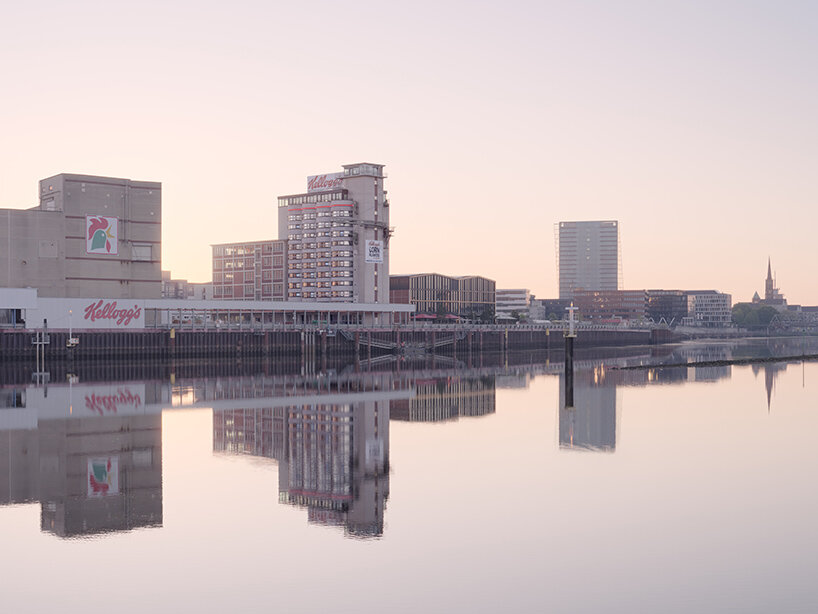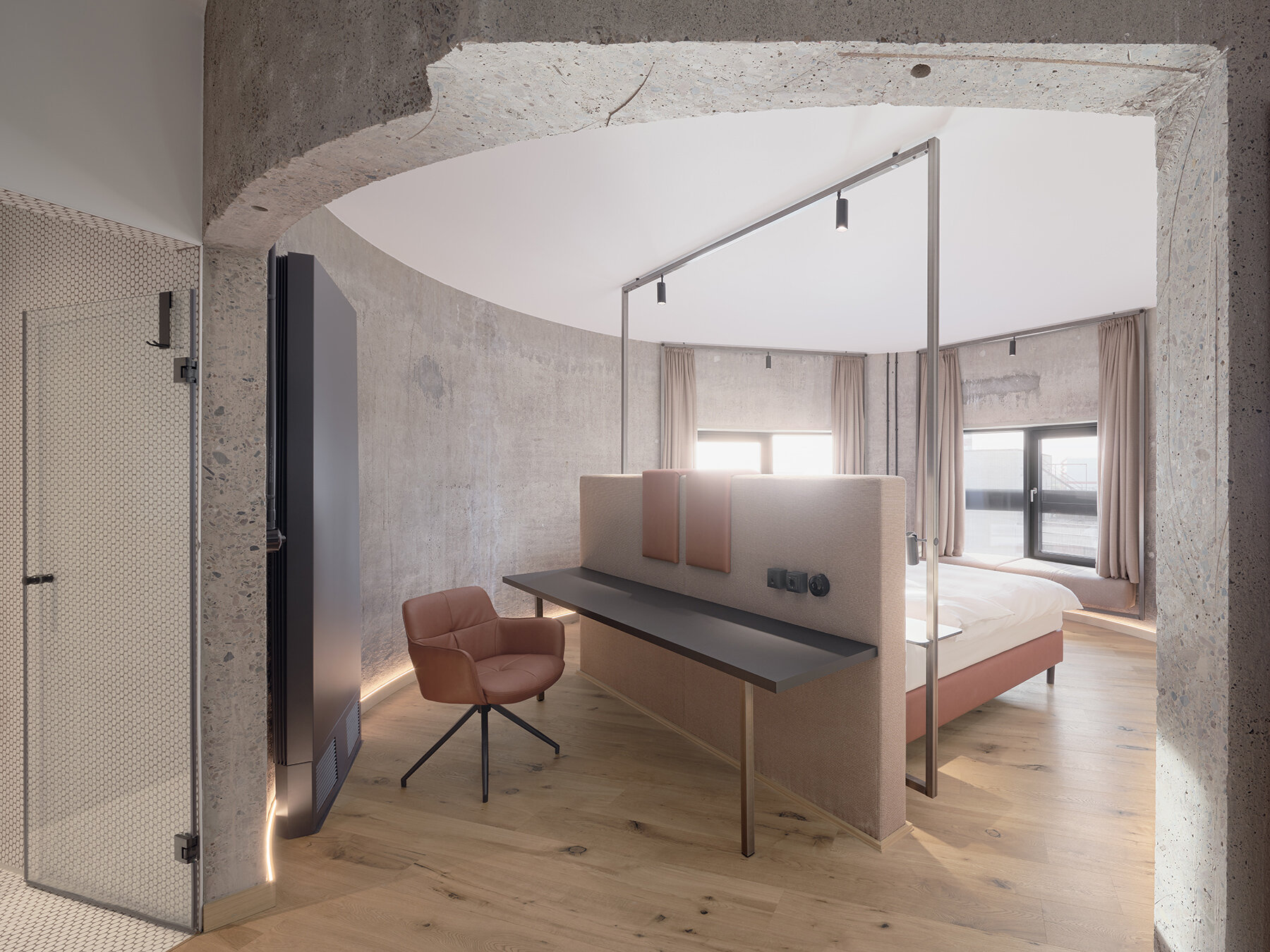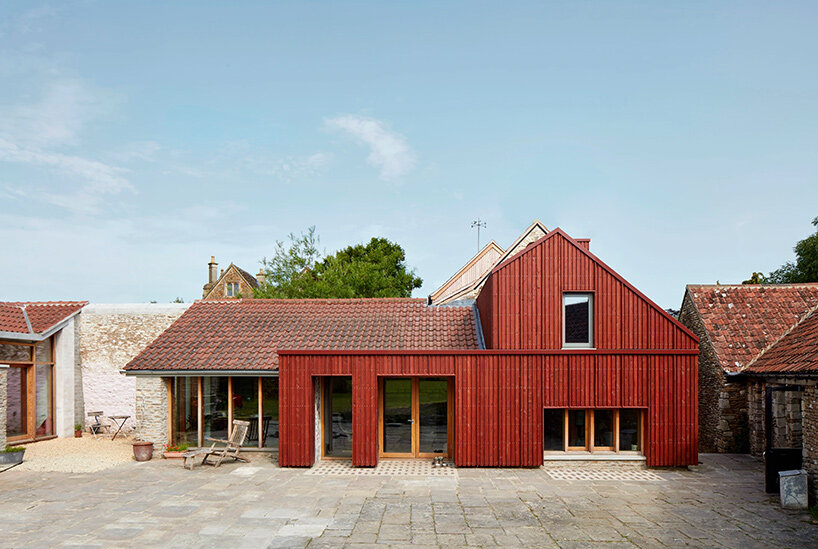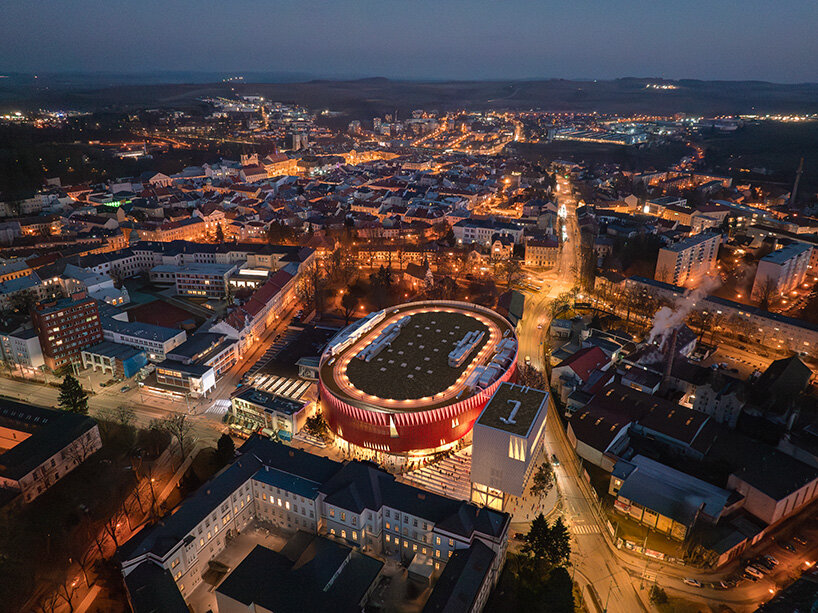Urban transformation in Bremen’s harbor district
In Bremen, Germany, a cluster of 1970s grain silos once used by Kellogg’s has been transformed into the John & Will Silo Hotel by Delugan Meissl Associated Architects (DMAA). The site, located on the Überseeinsel peninsula within the larger redevelopment of Überseestadt, forms part of one of Europe’s most ambitious urban renewal projects. With the River Weser on one side and Bremen’s city center nearby, the intervention repositions industrial heritage as a civic and cultural landmark.
The former Kellogg’s site, now a mixed-use complex, maintains the prominence of the original silos while introducing new programs across its perimeter. DMAA’s response preserves the visual identity of the site while subtly threading it into the changing rhythm of the waterfront.

images © Piet Niemann
Silos reimagined as hotel architecture
The concrete silos in Bremen, once capable of storing up to 5,000 tons of Kellogg’s grain, are now occupied by 117 uniquely configured guest rooms for the John & Will Silo Hotel. The architects at DMAA plan each room with a circular or semi-circular floorplan, following the geometry of the original silo forms. Vertical window slits have been carved through sixteen-centimeter-thick concrete walls to frame narrow, cinematic views of the Weser. These minimal apertures maintain the visual weight of the structures while admitting natural light deep into the cylindrical spaces.
The original red Kellogg’s logo remains emblazoned atop the tallest silos, asserting continuity with the past even as the interior is radically repurposed. Below, a low-rise annex formerly used as a vitamin store has been adapted into five levels of office and conference spaces, with a new rooftop pavilion serving as an event venue.

the Kellogg’s silos in Bremen have been transformed into a hotel by DMAA
Cutting through concrete, connecting new volumes
To adapt the Kellogg’s silos for hospitality use in Bremen, DMAA introduced new interior corridors and openings that connect the cylinders. Access routes were carefully threaded through the concrete mass, and 3,500 cubic meters of concrete were excavated and removed by hand. The hotel lobby incorporates the silos’ original funnel-shaped bases, allowing the building’s industrial function to remain legible within the new program.
The architectural intervention extends beyond the hotel. The adjacent rice store has been adapted into a market hall and restaurant cluster, while new terraces and an in-house brewery activate the waterfront with public life. These spaces contribute to a broader strategy for integrating communal amenities within the former industrial fabric of Bremen.

the project is located on the Überseeinsel within Bremen’s larger harbor redevelopment

DMAA preserved the industrial character of the original 1970s concrete structures

the complex includes restaurants, a brewery, and a market hall within the adjacent rice store

117 hotel rooms are carved into the cylindrical and semi-cylindrical forms of the silos

3,500 cubic meters of concrete were excavated to enable circulation within the silos

narrow vertical windows cut into the thick concrete offer framed views of the Weser
project info:
name: Kellogg’s Bremen Germany
architect: Delugan Meissl Associated Architects | @deluganmeissl
location: Bremen, Germany
client: John & Will | @johnandwill.hotel
address: Auf der Muggenburg 30, 28217 Bremen, Germany
completion: 2024
photography: © Piet Niemann | @_piet_niemann
project manager: Eva Schrade
project team: Birgit Miksch, Julia Oblitcova, Klaudia Prikrill, Martin Schneider,
executive planning: dt+p, Gruppe GME Architekten
structural engineering: Wittler Ingenieure
lighting design: Die Lichtplaner
building services engineering: Schweigatz Heizungsund Sanitärbau
building physics: Wittler Ingenieure
The post DMAA transforms kellogg’s silos into waterfront hotel in bremen, germany appeared first on designboom | architecture & design magazine.


